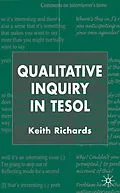Graduate and professional TESOL students will welcome this research methods textbook for undertaking qualitative, naturalistic and action research projects. Uniquely, the book offers a three-level structured progression, suited both to novice and intermediate students with a focus on development as classroom teachers of English, and to advanced students engaged in academic research work in applied linguistics. Every chapter is structured to develop the important skills for undertaking QI in a rigorous and serious way, at whatever level is appropriate for the reader's purpose. The book is both scholarly in approach and written in an engagingly direct and clear style.
Autorentext
Keith Richards is an Associate Professor at the University of Warwick, UK. His main research interests lie in the area of professional interaction and his recent publications include Qualitative Inquiry in TESOL, Applying Conversation Analysis (edited with Paul Seedhouse), and Professional Encounters in TESOL (edited with Sue Garton).
Zusammenfassung
More and more teachers of English are discovering the contribution that Qualitative Inquiry can make to their work and professional development. Qualitative Inquiry in TESOL offers a unique three-level introduction to qualitative research designed specifically for TESOL professionals.The book introduces different research traditions and embraces the whole research process. At its core are user-friendly chapters designed to develop essential research skills in interviewing, observation, and analysing spoken interaction. Each chapter includes:* an introduction to the topic* activities for skills development* boxed summaries, procedures, tips, checklists, etc* illustrative case studies* detailed advice on further study* graded tasks for skills refinementQualitative Inquiry in TESOL will be particularly valuable on Certificate, Diploma, Masters and PhD programmes, where students can access different research skills at a level appropriate to their needs and draw on the book as a resource when undertaking specific projects.
Inhalt
Introduction The Nature of Qualitative Inquiry Interviewing Observation Collecting and Analysing Spoken Interaction Planning a Project Analysis and Representation Epilogue: Qualitative Inquiry and Teaching References Index
